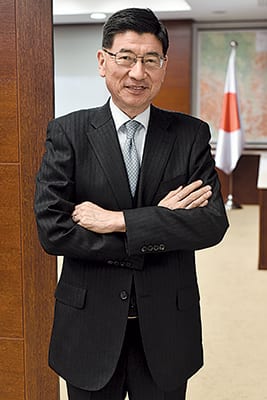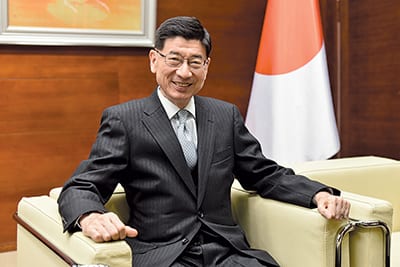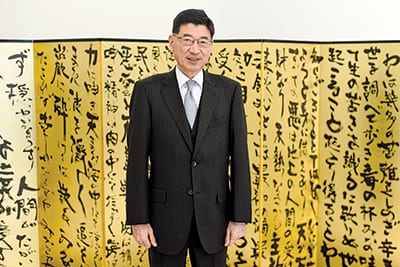The visit of Japanese Prime Minister Shinzō Abe to Serbia after 31 years was truly epoch-making. As a result, young Japanese volunteers will soon arrive in Serbia, while some Japanese companies have started recognising the benefits of Serbia. Our embassy is willing to help these initiatives.
Although geographically distant, Serbia and Japan are moving much closer to one another: political events, such as the official visit of Japanese Prime Minister Shinzō Abe to Serbia, have increased interest in this market among Japanese companies, while the warmth and compassion felt between our two nations are equally important for discovering mutual ties.
What did this January’s official visit of Japanese Prime Minister Shinzō Abe to Serbia bring to bilateral relations between the two countries?
First of all, it should be stressed that PM Abe’s visit to Belgrade was truly epoch-making. The previous visit of a Japanese prime minister occurred 31 years ago. Since then, no Japanese prime minister visited Belgrade until this January. The highlight of his visit was, of course, the bilateral summit meeting with President Vučić. The two leaders had good chemistry and held intensive discussions on how to further strengthen our existing cordial bilateral relations and how to closely work together to tackle various global challenges.
 As a result of the bilateral summit meeting, PM Abe announced the Western Balkan Cooperation Initiatives, aimed at promoting cooperation between Japan and the region. Some of the items decided in the Initiative have already been implemented. For example, we appointed an ambassador in charge of Western Balkan Affairs for the first time, dispatched a JICA mission to investigate the needs for assistance in the region, invited 17 young people from the region under the MIRAI (meaning “future” in Japanese) Programme, in cooperation with the Regional Youth Cooperation Office (RYCO), and held an investment seminar in Tokyo to showcase the region’s potential to Japanese investors.
As a result of the bilateral summit meeting, PM Abe announced the Western Balkan Cooperation Initiatives, aimed at promoting cooperation between Japan and the region. Some of the items decided in the Initiative have already been implemented. For example, we appointed an ambassador in charge of Western Balkan Affairs for the first time, dispatched a JICA mission to investigate the needs for assistance in the region, invited 17 young people from the region under the MIRAI (meaning “future” in Japanese) Programme, in cooperation with the Regional Youth Cooperation Office (RYCO), and held an investment seminar in Tokyo to showcase the region’s potential to Japanese investors.
Moreover, I would like to point out that PM Abe was accompanied by a high-powered business delegation consisting of 16 CEOs of Japanese companies. They joined the enlarged bilateral summit meeting and discussed how to promote business relations between our two countries. Since PM Abe’s visit, our Embassy has been receiving more inquiries than ever before from Japanese companies that are seriously considering investing in Serbia. Actually, this year alone saw one Japanese company decide to open a factory in Smederevo and saw Japan Tobacco International (JTI) expand its production line in Senta. These are tangible effects of PM Abe’s visit to Serbia.
Finally, I would also like to touch upon the exchange of notes regarding the dispatch of Japanese Overseas Cooperation Volunteers (JOCV). European Integration Minister Jadranka Joksimović and I exchanged these notes immediately after the bilateral summit meeting. Due to this exchange of notes, Japan can now dispatch young capable volunteers to Serbia. JICA is currently in the process of selecting participants in the first batch of JOCV, who are to be sent to Serbia shortly.
How would you rate Serbia’s progress in terms of EU integration?
I know that Serbia has been exerting great efforts towards EU accession, with the aim of joining by 2025. Japan welcomes such efforts from Serbia and is ready to provide support. Last year saw the Government of Japan extend the 1st yen loan project, worth 200 million euros, for the installing of flue gas desulphurisation equipment at the Thermal Power Plant Nikola Tesla. This project aims at purifying emissions from this power plant. Given that environmental protection is one of the key elements of EU accession, I’m confident that this project is conducive to Serbia’s EU accession efforts, in addition to alleviating air pollution.
I think there is still much to be done on the dissemination of information about Serbia within Japanese society.
I’m fully aware that Serbia needs to go through a series of tough social and economic reforms in order to join EU. But it deserves to be well supported in undertaking these tough reforms. The latest statistics on economic growth actually show that Serbia’s economic reform is delivering positive results. In this regard, I would like to congratulate Serbia on its remarkable economic growth, which exceeds four per cent.
How closely are Japanese companies monitoring the progress of reforms in Serbia? How often does the Embassy receive inquiries regarding investment in Serbia?
An increasing number of Japanese companies are interested in doing business in Serbia. Following PM Abe’s visit to Serbia, more interest in Serbia among Japanese companies has been demonstrated, including among medium-sized Japanese companies. Serbia is a country located a long way from Japan and we don’t have much information on doing business in Serbia.However, some companies have started recognising the benefits of Serbia and the activities of Serbia with which the Embassy is willing to help. Other Japanese companies doing business in EU countries are also considering the expansion of their business to this region.
There are several ways for Japanese companies to enter Serbia. Some Japanese companies go to the Development Agency of Serbia. In this respect, we expect the Development Agency to function as a one-stop-service body in support of those Japanese investors.
The Japanese Business Alliance in Serbia (JBAS) can also serve as a portal to Serbia for Japanese companies. It gained membership in the network of the Japan Chamber of Commerce & Industry (JCCI).
The Embassy of Japan has been cooperating continuously with JBAS, the Development Agency of Serbia and also the Chamber of Commerce & Industry of Serbia in attracting the investments of Japanese companies in Serbia, and it will continue with its efforts to increase Japanese investments.
Serbia recently advanced on the list of the World Bank’s Doing Business Index, but not as much as it would have liked. What would you recommend as the Japanese recipe for improving the country’s business climate?
According to the latest Index, Serbia advanced to 43rd this year, which is nine places behind Japan.

As the gap in the positions of Japan and Serbia isn’t that great, it may be easily reversed in the future. It is not recommended that Serbia simply copy some solutions from other countries. Serbia has been proceeding in its own way in the creation of a stable political and economic environment, which has resulted in budget consolidation, a reduced unemployment rate and a growing number of foreign investments.
The IMF mission recently pointed out that it is necessary to continue structural reforms, as well as to finalise the privatisations of state-owned companies and banks. In that respect, Serbia is aware of the direction of reforms and we will fully support Serbia on such efforts.
Japan is among the most important investors in Belgrade, amongst other things, when it comes to the construction of a municipal waste processing plant in Vinča. Are you satisfied with the way this investment is progressing?
I have been updated on the status of the waste processing plant project in Vinča. My understanding is that, whilst at some point, the project was lagging behind schedule, it is now getting back on track. There are still challenges, but I’m convinced that construction works will begin shortly.
The cherry blossom tree is a symbolic flower of Japan. It would be very nice if more Serbian citizens could share the feeling of enjoying cherry blossoms with us
During your recent participation in the meeting of the Association of Japanese Businesspeople for Southeast Europe, you planted several Japanese cherry blossom trees in Belgrade. Should Serbian towns and cities be adorned with more of these trees?
Cherry blossom is a symbolic flower of Japan. In ancient times, when Japanese people said “flower” they automatically meant cherry blossom. This tree is gorgeous when it blossoms, but is fairly short-lived. That must be why we love it more than any other flower – due to its transient beauty. It would be very nice if more Serbian citizens could share this feeling of enjoying cherry blossoms with us.
To what extent have the ordinary people of our two countries been brought closer together as a result of the mutual concern and care shown by citizens of both Serbia and Japan in response to assisting the victims of various natural disasters?
First of all, I would like to express my deepest appreciation for Serbia’s donation, which amounted to approximately half a million euros for the victims of floods in Japan last July. Serbia was among the most generous donors to the victims among all the countries of the world. I am also deeply touched by the fact that the Serbian people didn’t forget what we did for the victims of the 2014 flooding in Serbia. Every time I express my appreciation for Serbia’s donation, Serbian people always tell me that they never forgot our assistance of 2014. As Ambassador of Japan, I will do my best to let the Japanese people know more about this kind of strong link and friendship between our two countries. I think there is still much to be done on the dissemination of information regarding Serbia within Japanese society. Once again, I thank the Serbian people very much.
You recently presented the “Japanese Ambassador’s Award” to one publishing company that fosters the tradition of traditional and contemporary Japanese literature. Which kinds of occasions result in this award being presented?
That depends on many aspects, but we generally we decide to present such awards when we recognise a long-term and continuous contribution to Japan, or to Japan-Serbia relations. Publishing agencies “Kokoro” and “Tanesi” have been contributing to the disseminating of information regarding our culture in Serbia through the publishing of a substantial number of Japanese books or books on our country. We appreciate such efforts and thought that the Belgrade Book Fair would provide be the best occasion to express our gratitude.
I personally visited Hofu and Kashiwazaki, two cities earmarked to host Serbia’s volleyball and water polo teams during the 2020 Olympic Games in Japan, and am proud to say that they are perfectly ready!
Japan will host the 2020 Olympic Games. How are preparations advancing and will everything be completed in time for you to receive athletes?
The Tokyo Olympics will be held from 24th July to 9th August 2020. We were happy to witness Serbia’s women’s volleyball team qualifying for the big games by winning gold at the recent World Championships in Japan. Actually, Hofu, a city located in Western Japan’s Yamaguchi prefecture, welcomed the same team before the championships.  The city was declared as the “host town” for Serbia’s volleyball teams (Men and Women) and plans to assist athletes in their preparations before the Olympics. In the same way, the city of Kashiwazaki in the Nigata prefecture, located in the central part of Japan, is waiting to welcome the Serbia water polo team. I personally visited these two cities this year, and am proud to say that they are perfectly ready!
The city was declared as the “host town” for Serbia’s volleyball teams (Men and Women) and plans to assist athletes in their preparations before the Olympics. In the same way, the city of Kashiwazaki in the Nigata prefecture, located in the central part of Japan, is waiting to welcome the Serbia water polo team. I personally visited these two cities this year, and am proud to say that they are perfectly ready!
The Japanese love to host major sporting events and are well experienced. We will also host the Rugby Union World Cup in 2019. I’m certain that Japan will work hard to live up to its reputation and that preparations will be completed well in advance.
Signs have recently emerged suggesting that Japan is starting to build Industry 5.0., which is centred around people. What would you say to Serbia, which is exerting efforts to stride over the threshold of Industry 4.0?
“Society 5.0” represents the 5th form of society in our human history, chronologically following hunting, farming, industry and information. To balance economic advancement with the resolution of social problems and bring about a human-centred society, this fourth Industrial revolution realises the advanced fusion of cyberspace and physical space. In a society realised with “Society 5.0”, all types of data will be gathered from sensors installed throughout physical spaces via the Internet of Things. All I can say is that Japan is striving seriously to achieve the world of “Society 5.0”, but there will be many challenges ahead before we can realise such an extraordinarily advanced society.
| BREAKTHROUGH
As a result of the Western Balkan Cooperation Initiative, we appointed an ambassador in charge of Western Balkan Affairs for the first time |
SUPPORT
We expect the Development Agency of Serbia to function as a one-stop-service body in support of Japanese investors who are increasingly interested in the Serbian market |
COMPASSION
Serbia was one the most generous donors to the victims of Japanese floods among all the world’s countries. |
|---|